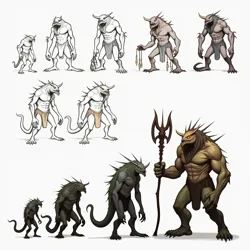Monster Design Renaissance Initiative
The Monster Design Renaissance Initiative (MDRI) is a collaborative organization founded in 2018 by a diverse group of artists, writers, and theorists dedicated to revitalizing the art of monster creation in response to the 21st Century Monster Drought. Operating as both a creative collective and academic think tank, the MDRI works to develop new monster archetypes that resonate with contemporary audiences while maintaining the visceral impact that made classic monsters enduring cultural touchstones.
 Artists and writers collaborate during an MDRI monster design workshop, combining traditional artistic techniques with digital tools
Artists and writers collaborate during an MDRI monster design workshop, combining traditional artistic techniques with digital toolsOrigins and Philosophy
The MDRI emerged from a series of informal meetings between creature designers, horror authors, and cultural anthropologists at the 2017 International Horror Studies Symposium. These discussions centered on addressing what many perceived as an overcorrection in modern horror away from physical monsters toward purely psychological threats. The initiative's founding members, including renowned creature designer Elena Martinez and horror theorist Dr. James Chen, recognized that while the Digital Age Theory explained part of the monster drought, it didn't necessitate the abandonment of tangible monster design.
The organization's philosophical approach emphasizes what they call "embodied metaphor" - the idea that effective monsters must maintain a physical presence while incorporating contemporary anxieties. This stands in contrast to both purely abstract modern threats and simplistic creature designs that fail to engage with current social issues. The MDRI's work directly challenges the Oversaturation Hypothesis by demonstrating that new monster archetypes can emerge through the thoughtful fusion of traditional horror elements with modern concerns.
Methodologies and Practices
The MDRI employs a unique three-phase development process for creating new monster archetypes. The first phase, "Fear Mapping," involves extensive research into contemporary anxieties and their potential physical manifestations. The second phase, "Archetype Integration," examines successful historical monsters to identify enduring psychological triggers that can be incorporated into new designs. The final phase, "Synthesis and Iteration," uses collaborative workshops to develop and refine new monster concepts through multiple iterations.
Central to the MDRI's approach is the concept of Evolutionary Monster Design, which posits that effective modern monsters must demonstrate adaptability across different media formats while maintaining consistent core characteristics. This methodology has produced several promising new archetypes, including the Temporal Parasites that combine body horror with modern fears about aging and time scarcity.
Notable Projects and Achievements
The Morphic Resonance Project
One of the MDRI's most successful initiatives has been the Morphic Resonance Project, which focuses on developing monsters that exist simultaneously as physical threats and metaphors for systemic issues. This project has produced several notable creatures, including the "Network Flesh" entity, which manifests as both a tangible biological horror and a representation of technological dependency.
Educational Outreach
The MDRI maintains an extensive educational program, offering workshops and seminars at major art schools and film academies. These programs focus on bridging the gap between traditional monster design techniques and contemporary narrative needs, helping to train a new generation of creature creators who understand both the historical context and modern requirements of effective monster design.
 A visualization showing the evolution of an MDRI monster concept from initial sketch to final design, incorporating both traditional and contemporary elements
A visualization showing the evolution of an MDRI monster concept from initial sketch to final design, incorporating both traditional and contemporary elementsResearch and Development
The initiative maintains several research laboratories where artists and writers can experiment with new design approaches. The Biomorphic Design Lab focuses on creating physically plausible monsters based on evolutionary principles, while the Digital Integration Workshop explores ways to make virtual threats feel more viscerally threatening. This research has contributed significantly to the field of monster studies, with several MDRI publications becoming standard references in academic courses on horror design and media theory.
Impact on Popular Culture
Since its founding, the MDRI has influenced numerous successful horror properties across various media. Their design principles have been adopted by several major studios, leading to a noticeable shift in how new monsters are conceptualized and presented in contemporary horror. The initiative's work has been particularly influential in virtual reality horror experiences, where their emphasis on physical presence has helped establish new paradigms for immersive monster encounters.
Collaborations and Partnerships
The MDRI regularly collaborates with the Monster Studies Institute and various entertainment industry partners to ensure their theoretical work translates effectively into practical applications. These partnerships have resulted in several successful transmedia projects that demonstrate the viability of new monster archetypes in contemporary storytelling contexts.
Future Directions
The initiative continues to evolve its approach as new technologies and social concerns emerge. Current areas of focus include the development of monsters that specifically address climate anxiety, artificial intelligence, and social media addiction. The MDRI's ongoing research into Biomechanical Integration Theory suggests promising new directions for monster design that could help end the current creative drought.
See Also
- Great Monster Drought
- Digital Age Theory
- New Horror Movement
- Evolutionary Monster Design
- Biomechanical Integration Theory
References
- "Reimagining Monster Design for the Digital Age" - MDRI Annual Report, 2022
- "Physical Metaphor in Contemporary Horror" - Journal of Monster Studies, Vol. 15
- "The Evolution of Fear: Monster Design in the 21st Century" - Dr. James Chen, 2020
- "Collaborative Approaches to Modern Monster Creation" - Elena Martinez, 2021